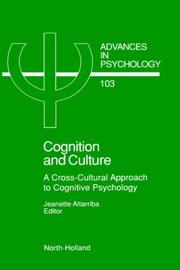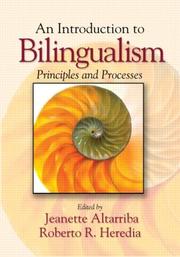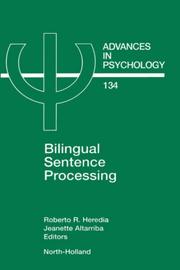| Listing 1 - 10 of 23 | << page >> |
Sort by
|
Book
ISBN: 1107419867 9781107419865 Year: 2014 Publisher: Cambridge : Cambridge University Press,
Abstract | Keywords | Export | Availability | Bookmark
 Loading...
Loading...Choose an application
- Reference Manager
- EndNote
- RefWorks (Direct export to RefWorks)
The relationship between memory and language and the topic of bilingualism are important areas of research in both psychology and linguistics and are grounded in cognitive and linguistic paradigms, theories and experimentation. This volume provides an integrated theoretical/real-world approach to second language learning, use and processing from a cognitive perspective. A strong international and interdisciplinary team of contributors present the results of various explorations into bilingual language processing, from recent advances in studies on bilingual memory to studies on the role of the brain in language processing and language forgetting. This is a strong yet balanced combination of theoretical/overview contributions and accounts of novel, original, empirical studies which will educate readers on the relationship between theory, cognitive experimentation and data and their role in understanding language learning and practice
Zweisprachigkeit. --- Gedächtnis. --- Kognition. --- Psycholinguistik. --- Bilingualism --- Cognition. --- Memory. --- Psycholinguistics. --- Psychological aspects.

ISBN: 9780444896391 0444896392 Year: 1993 Publisher: Amsterdam ; New York : North-Holland,
Abstract | Keywords | Export | Availability | Bookmark
 Loading...
Loading...Choose an application
- Reference Manager
- EndNote
- RefWorks (Direct export to RefWorks)
Philosophy and psychology of culture --- Cognitive psychology --- Ethnology. Cultural anthropology --- Cognition and culture. --- Cognitive psychology. --- Ethnopsychology. --- Cognition and culture --- Ethnopsychology --- Anthropology, Cultural --- Mental Processes --- Psychiatry --- Sociology --- Psychology --- Behavioral Sciences --- Anthropology --- Social Sciences --- Psychological Phenomena and Processes --- Anthropology, Education, Sociology and Social Phenomena --- Psychiatry and Psychology --- Behavioral Disciplines and Activities --- Culture --- Cognition --- Cognitive Function --- Cognitions --- Cognitive Functions --- Function, Cognitive --- Functions, Cognitive --- Beliefs --- Cultural Background --- Cultural Relativism --- Customs --- Background, Cultural --- Backgrounds, Cultural --- Belief --- Cultural Backgrounds --- Cultural Relativisms --- Cultures --- Relativism, Cultural --- Relativisms, Cultural --- Science, Social --- Sciences, Social --- Social Science --- Proxemics --- Behavioral Science --- Proxemic --- Science, Behavioral --- Sciences, Behavioral --- Factors, Psychological --- Psychological Factors --- Psychological Side Effects --- Psychologists --- Psychosocial Factors --- Side Effects, Psychological --- Factor, Psychological --- Factor, Psychosocial --- Factors, Psychosocial --- Psychological Factor --- Psychological Side Effect --- Psychologist --- Psychosocial Factor --- Side Effect, Psychological --- General Social Development and Population --- Psychiatrists --- Psychiatrist --- Human Information Processing --- Information Processing, Human --- Cultural Anthropology --- Material Culture --- Ethnography --- Culture, Material --- Ethnographies --- Material Cultures --- Qualitative Research --- Cross-cultural psychology --- Ethnic groups --- Ethnic psychology --- Folk-psychology --- Indigenous peoples --- National psychology --- Psychological anthropology --- Psychology, Cross-cultural --- Psychology, Ethnic --- Psychology, National --- Psychology, Racial --- Race psychology --- National characteristics --- Psychology, Cognitive --- Cognitive science --- Culture and cognition --- Ethnophilosophy --- Socialization --- Cultural Psychiatry --- Ethnopsychiatry --- Transcultural Psychiatry --- Transcultural Psychology --- Psychiatry, Cultural --- Psychiatry, Transcultural --- Psychology, Transcultural --- Transcultural Nursing

ISBN: 9780444896391 0444896392 Year: 1993 Publisher: New York North-Holland
Abstract | Keywords | Export | Availability | Bookmark
 Loading...
Loading...Choose an application
- Reference Manager
- EndNote
- RefWorks (Direct export to RefWorks)
While the main source of knowledge of human cognition has come from studies of information processing in a single culture, primarily within the U.S. or within certain countries in Europe, much research has also been conducted in other parts of the world. Can the study of cognition across cultures lead us to interesting conclusions about human cognition in general? Surely any general theory of language processing, for example, must be able to explain phenomena observed across cultures and not just within a single one. This book is an attempt to look at this issue of universals in thinking and understanding by providing a compendium of cross cultural investigations in the four major areas of cognitive psychology: (1) memory and knowledge representation, (2) language processing, (3) perception, and (4) reasoning and problem solving. The differences found across cultures are also fascinating and extremely informative. A final chapter provides a summary of the major findings reported in each of these areas. The chapters included in this work were written for those interested in cross-cultural psychology and also those with an interest in cultural anthropology. The authors are well-known in the areas of cross-cultural psychology, cognitive psychology, linguistics, and anthropology. However, the reader need not be an expert in any one of these fields to understand the conclusions and implications of the work reported here.
Multi
ISBN: 9781107008908 9781139035279 9781139839983 1139839985 1139035274 9781283836203 1283836203 1139842366 9781139842365 1107008905 1139853805 1107234492 1139845713 1139844725 1139841173 1107419867 9781107419865 9781107419865 Year: 2012 Publisher: Cambridge Cambridge University Press
Abstract | Keywords | Export | Availability | Bookmark
 Loading...
Loading...Choose an application
- Reference Manager
- EndNote
- RefWorks (Direct export to RefWorks)
"The relationship between memory and language and the topic of bilingualism are important areas of research in both psychology and linguistics and are grounded in cognitive and linguistic paradigms, theories and experimentation. This volume provides an integrated theoretical/real-world approach to second language learning, use and processing from a cognitive perspective. A strong international and interdisciplinary team of contributors present the results of various explorations into bilingual language processing, from recent advances in studies on bilingual memory to studies on the role of the brain in language processing and language forgetting. This is a strong yet balanced combination of theoretical/overview contributions and accounts of novel, original, empirical studies which will educate readers on the relationship between theory, cognitive experimentation and data and their role in understanding language learning and practice"--
Psycholinguistics --- 159.95 --- 800.73 --- 800.73 Tweetaligheid. Meertaligheid. Vreemde talen. Vertalen --- Tweetaligheid. Meertaligheid. Vreemde talen. Vertalen --- 159.95 Geestelijke functies --- Geestelijke functies --- Bilingualism --- Cognition --- Memory --- Language, Psychology of --- Language and languages --- Psychology of language --- Speech --- Linguistics --- Psychology --- Thought and thinking --- Retention (Psychology) --- Intellect --- Comprehension --- Executive functions (Neuropsychology) --- Mnemonics --- Perseveration (Psychology) --- Reproduction (Psychology) --- Psychological aspects --- Cognition. --- Memory. --- Psycholinguistics. --- Bilinguisme --- Mémoire --- Psycholinguistique --- Psychological aspects. --- Aspect psychologique --- Mémoire. --- Psycholinguistique. --- Aspect psychologique. --- Health Sciences --- Psychiatry & Psychology --- Bilinguisme.

ISBN: 9780805851359 0805851356 9780805851342 0805851348 9781410618856 1410618854 Year: 2008 Publisher: New York, N.Y. Erlbaum
Abstract | Keywords | Export | Availability | Bookmark
 Loading...
Loading...Choose an application
- Reference Manager
- EndNote
- RefWorks (Direct export to RefWorks)
Psycholinguistics --- Sociolinguistics --- Bilingualism --- #KVHB:Tweetaligheid --- Bilingualism. --- Tweetaligheid (algemene studies) --- Tweetaligheid --- Tweetaligheid (algemene studies). --- Tweetaligheid. --- Language and languages --- Languages in contact --- Multilingualism
Book
ISBN: 1461492173 1493917005 1461492181 9781461492177 Year: 2014 Publisher: New York, NY : Springer New York : Imprint: Springer,
Abstract | Keywords | Export | Availability | Bookmark
 Loading...
Loading...Choose an application
- Reference Manager
- EndNote
- RefWorks (Direct export to RefWorks)
Foundations of Bilingual Memory provides a valuable update to the field of bilingual memory and offers a new psychological perspective on how the bilingual mind encodes, stores, and retrieves information. This volume emphasizes theoretical issues, such as classic memory approaches, Compound-Coordinate Bilingualism, Bilingual Dual Coding Theory, and Working Memory, about which relatively little has been written in the bilingual domain. Also covered are: • The neuropsychology of bilingual memory • Applied issues (such as false memories and bilingualism, emotion and memory) • Empirical findings in support of the uniqueness of the different memory systems of the bilingual individual • Connectionist models of bilingualism The volume represents the first book of its kind, in stressing a memory perspective with regards to bilingual speakers. It can serve as an advanced text for both undergraduate and graduate level students and it will be of great interest to the growing number of bilingual teachers and university classes interested in understanding the bilingual mind, as well as in preparing teachers to work with the bilingual individual.
Bilingualism. --- Memory. --- Retention (Psychology) --- Psychology. --- Linguistics. --- Cognitive psychology. --- Cognitive Psychology. --- Linguistics, general. --- Intellect --- Psychology --- Thought and thinking --- Comprehension --- Executive functions (Neuropsychology) --- Mnemonics --- Perseveration (Psychology) --- Reproduction (Psychology) --- Language and languages --- Languages in contact --- Multilingualism --- Consciousness. --- Bilingualism --- Psychological aspects. --- Apperception --- Mind and body --- Perception --- Philosophy --- Spirit --- Self --- Psychology, Cognitive --- Cognitive science --- Linguistic science --- Science of language

ISBN: 0444508473 9786611059774 0080500099 1281059773 058547382X 9780080500096 9780444508478 9780585473826 Year: 2002 Publisher: New York ; Amsterdam : Elsevier North-Holland,
Abstract | Keywords | Export | Availability | Bookmark
 Loading...
Loading...Choose an application
- Reference Manager
- EndNote
- RefWorks (Direct export to RefWorks)
Bilingual Sentence Processing
#PBIB:2002.3 --- #PBIB:2004.4 --- #PBIB:gift 2004 --- Bilingualism --- Language and languages --- Foreign language study --- Language and education --- Language schools --- Psychological aspects. --- Study and teaching. --- Language and languages Study and teaching --- Study and teaching
Book
ISBN: 9781848725850 184872585X 9781848725867 1848725868 Year: 2018 Publisher: New York, NY : Routledge,
Abstract | Keywords | Export | Availability | Bookmark
 Loading...
Loading...Choose an application
- Reference Manager
- EndNote
- RefWorks (Direct export to RefWorks)
Digital
ISBN: 9781461492184 Year: 2014 Publisher: New York, NY Springer
Abstract | Keywords | Export | Availability | Bookmark
 Loading...
Loading...Choose an application
- Reference Manager
- EndNote
- RefWorks (Direct export to RefWorks)
Foundations of Bilingual Memory provides a valuable update to the field of bilingual memory and offers a new psychological perspective on how the bilingual mind encodes, stores, and retrieves information. This volume emphasizes theoretical issues, such as classic memory approaches, Compound-Coordinate Bilingualism, Bilingual Dual Coding Theory, and Working Memory, about which relatively little has been written in the bilingual domain. Also covered are: • The neuropsychology of bilingual memory • Applied issues (such as false memories and bilingualism, emotion and memory) • Empirical findings in support of the uniqueness of the different memory systems of the bilingual individual • Connectionist models of bilingualism The volume represents the first book of its kind, in stressing a memory perspective with regards to bilingual speakers. It can serve as an advanced text for both undergraduate and graduate level students and it will be of great interest to the growing number of bilingual teachers and university classes interested in understanding the bilingual mind, as well as in preparing teachers to work with the bilingual individual.
Philosophy --- Cognitive psychology --- Psychology --- Linguistics --- psychologie --- filosofie --- cognitieve psychologie --- bewustzijn --- linguïstiek

ISBN: 9780080500096 0080500099 9780444508478 0444508473 058547382X 9780585473826 Year: 2002 Publisher: New York North-Holland/Elsevier
Abstract | Keywords | Export | Availability | Bookmark
 Loading...
Loading...Choose an application
- Reference Manager
- EndNote
- RefWorks (Direct export to RefWorks)
| Listing 1 - 10 of 23 | << page >> |
Sort by
|

 Search
Search Feedback
Feedback About UniCat
About UniCat  Help
Help News
News